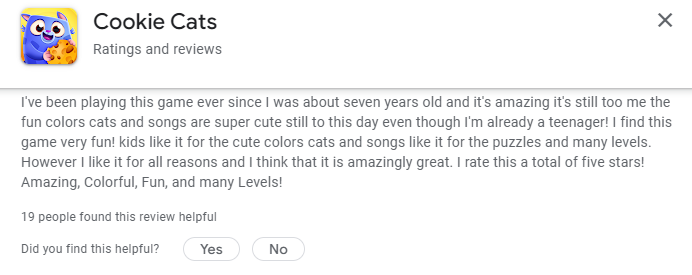Welcome to Pixalate’s CTV & Mobile App Manual Reviews According to COPPA, a series containing the detailed factors the Trust & Safety Advisory Board educators used to assess an app’s child-directedness.
The educators manually review thousands of mobile apps available in the Google Play & Apple App Stores as well as connected TV (CTV) apps from the Roku Channel Store and Amazon Fire TV App Store using the COPPA Rule factors shown below & make those results available to the public at ratings.pixalate.com.
This post takes a look at a popular mobile app (1 million+ downloads) from the Google Play Store & Apple App Store. Our reviewer discusses how the subjective factors set forth in the COPPA Rule apply to the app and factor into the reviewer's determination as to whether the app is child-directed or general audience (i.e., it is not targeting children).
Manually reviewed in this post
The 10 COPPA Rule factors
The teacher will indicate the factors they relied upon in their assessment using the 10 factors shown below that reflect the 10 child-directed factors in the COPPA Rule.

Reviewed by: Crystal Pearson

Manual Review: Cookie Cats
Likely audience after manual review


- Google Developer: Tactile Games
- Apple Developer: Tactile Games ApS
- Google Bundle ID: dk.tactile.cookiecats
- Apple Bundle ID: 1078297893
- Privacy Policy
- Crystal’s Take: Cookie Cats is a fun endless puzzle popping matching game.
COPPA factors used to determine audience
 and
and  and
and  and
and 
The Cookie Cats gameplay requires players to connect the cookies within the puzzle tile to the same color to clear the board and win that level. In six game modes, players will explore the neighborhood while taking on different challenging levels of feeding hungry cats. Players have to outwit nemesis using their cookie-connecting skills to defeat them. The visual content and animation have sharp bright and colorful cartoon graphics that are characteristics of child-oriented visuals. The music and sounds have charming cats singing captivating melodies after levels are completed. The game is great for visual-spatial reasoning and problem-solving.

Players earn power-ups as they progress through the levels which assist in challenging situations. Also, players will collect new cat characters throughout the game and rewards for solving cookie puzzles.

There is no age gate. The app does have in-app purchasing. It is rated E for Everyone 10+ in the Google Play store and 9+ in the iOS store. A review with age specifications posted in August 2020 in the Google Play store says, “I’ve been playing this game ever since I was about seven years old and it’s amazing.”
Privacy:
The developer’s privacy policy under the category of children states, “Our services are not targeted at children…consequently, we do not knowingly collect personal data from children under 13 years of age.” The developer has a minimum age table per country that can use their services.
Find Pixalate's full catalogue of reviews in our CTV and Mobile App Review Page
Screenshots of Cookie Cats




About Pixalate’s Trust & Safety Advisory Board
Pixalate’s Trust and Safety Advisory Board was created to bring in individuals with experience using child-directed apps in the classroom to review and assess which apps are child-directed. This manual review process serves to quality check Pixalate’s automated review process. See our full methodology for more information.
Disclaimer
This blog post published by Pixalate is available for informational purposes only and is not considered legal advice. By viewing this blog post, the reader understands and agrees that there is no attorney-client relationship between the reader and the blog publisher. The blog should not be used as a substitute for legal advice from a licensed professional attorney in the applicable jurisdiction(s), and readers are urged to consult their own legal counsel on any specific legal questions concerning any specific situation. The content of this blog post reflects Pixalate's opinions with respect to factors that Pixalate believes may be useful to the digital media industry. Pixalate's opinions are just that, opinions, which means that they are neither facts nor guarantees; and this blog post is not intended to impugn the standing or reputation of any entity, person or app, but instead, to report findings pertaining to mobile and Connected TV (CTV) apps.










